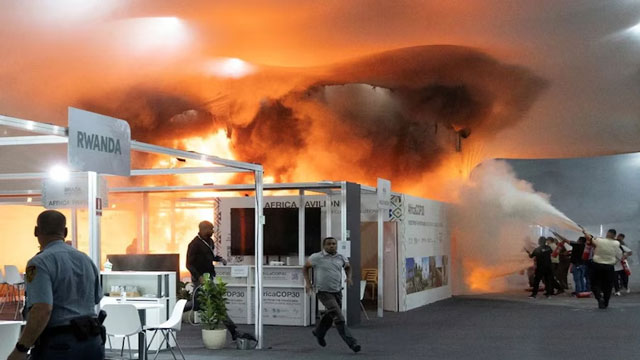Daijiworld Media Network - Belem
Belem, Nov 21: High tension and urgency marked the COP30 climate summit on Thursday as a sudden fire inside the venue disrupted proceedings and forced a mass evacuation, halting critical negotiations aimed at strengthening global climate commitments.
With the summit set to conclude within 24 hours, world leaders and negotiators were in the midst of intense discussions when flames erupted in an exhibition pavilion. Security footage showed the fire spreading quickly along the fabric-lined walls and ceiling before firefighters acted swiftly to extinguish it. Thirteen people were treated for smoke inhalation, and preliminary reports suggest an electrical appliance, likely a microwave, may have triggered the blaze.

The evacuation brought all negotiations to an abrupt halt, with talks expected to resume only on Friday morning after safety assessments. The Brazilian COP presidency, however, continued behind-the-scenes consultations with key negotiating groups through the evening.
The incident came at a time when the summit had already missed its Wednesday deadline to reach agreement on major issues, including climate finance and the global transition away from fossil fuels. Earlier in the day, Brazil circulated a draft proposal to select governments, but the document did not include a roadmap for phasing out fossil fuels — a major demand from several nations. It did, however, propose tripling adaptation finance by 2030 compared to 2025 levels, without clarifying whether the funds would come from wealthy countries, development banks, or private financiers.
Negotiators were divided, with some stating they had received the draft moments before the evacuation, while others claimed they had not been briefed at all.
The summit has been overshadowed by sharp divisions on the future of fossil fuels and climate finance delivery. Brazil, along with several developed and developing countries, has been pushing for a clear, collective plan to transition away from fossil fuels, but oil-producing nations continue to resist binding commitments. Although COP28 had agreed in principle to such a transition, countries have yet to outline how and when it will be executed.
Equally contentious is the issue of adaptation financing. Developing nations have expressed deep frustration over the reluctance of wealthier countries to guarantee funds needed to combat severe climate impacts. Trust deficits remain high, particularly after last year’s $300 billion climate finance pledge from COP29 failed to gain credibility — further strained by the United States withdrawing from climate cooperation under President Donald Trump.
“Right now, our people are losing their lives and livelihoods from unprecedented storms,” said Palau’s Minister of Agriculture, Fisheries and Environment, Steven Victor. “If we leave Belem without a transformative outcome on adaptation, it will be a failure.”
European delegates acknowledged the importance of boosting adaptation finance but maintained they were not authorised to commit to new targets.